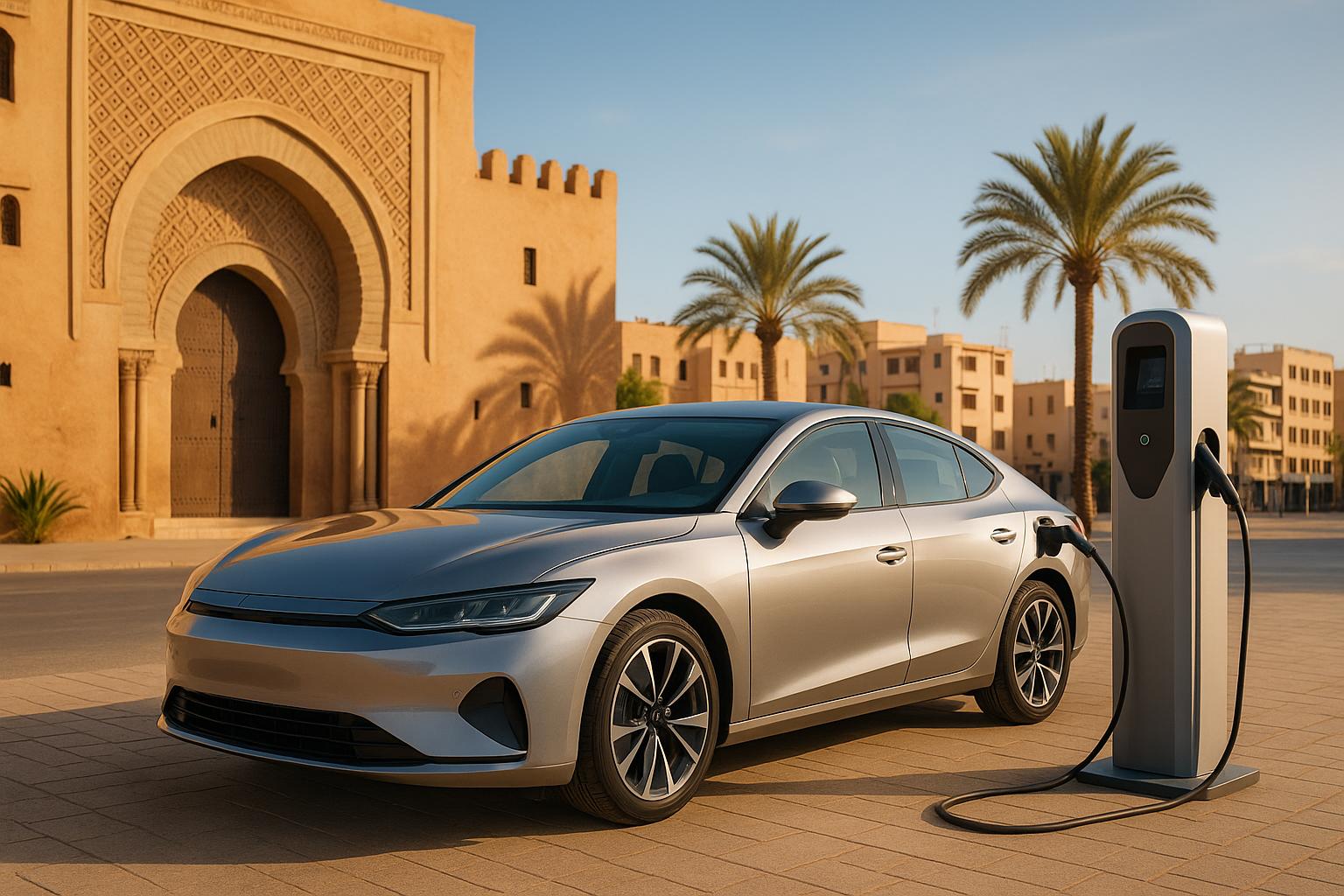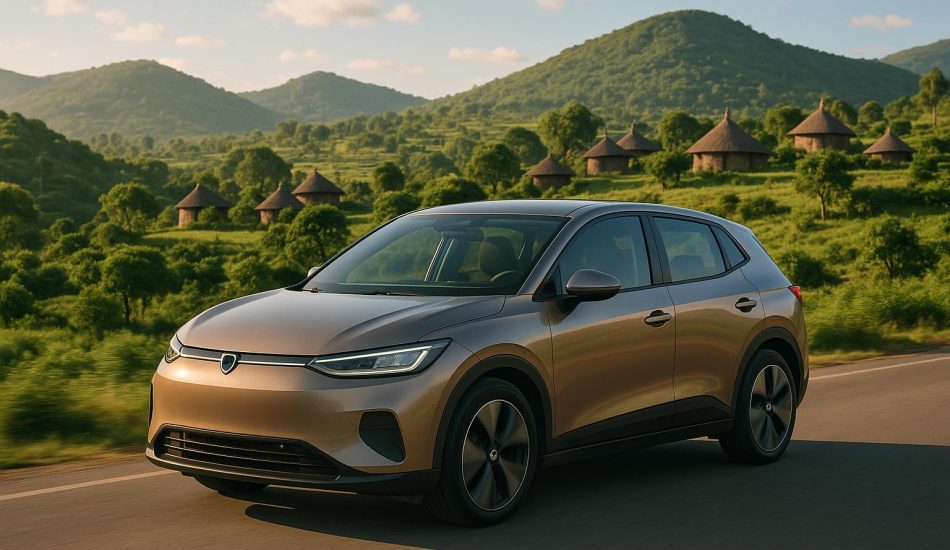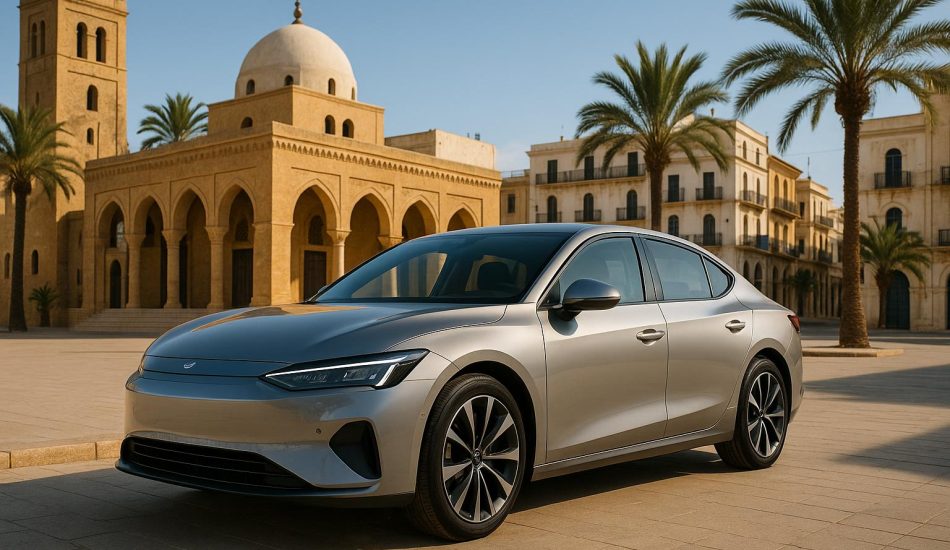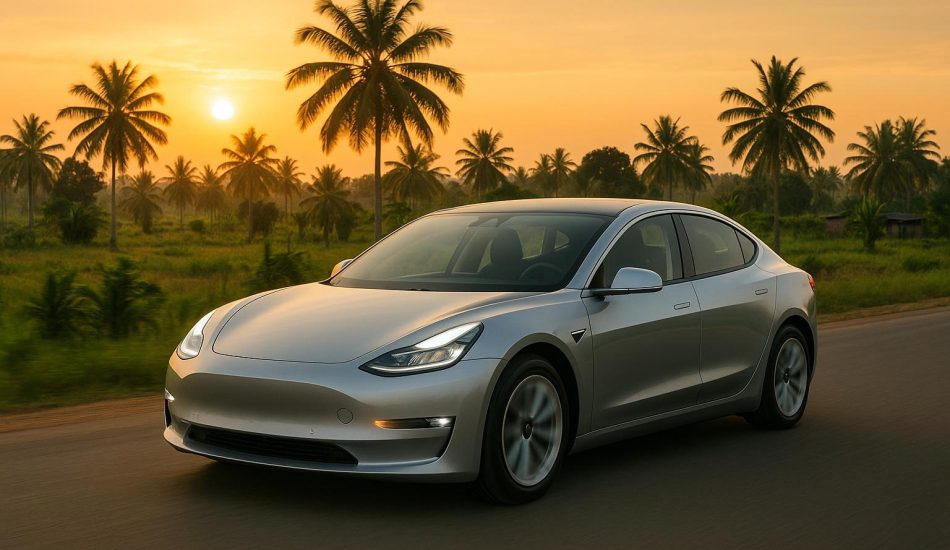
Thinking about owning an electric car in Morocco? Here’s what you need to know:
- Market Growth: Morocco’s EV market is booming, expected to grow from $108.4 million in 2025 to $163.4 million by 2029.
- Local and Import Options: Choose from local models (like Citroën and Peugeot) or import premium brands (Tesla, BYD, Mercedes).
- Cost Benefits: Enjoy 100% VAT and customs duty exemptions, no circulation taxes, and lower maintenance and charging costs.
- Import Process: Requires documents like a commercial invoice, import license, and customs declaration. Shipping options include RoRo or container transport.
- Charging Infrastructure: Expanding networks in cities and highways, with free or low-cost charging at official stations.
Key Takeaway: Morocco’s government incentives, growing infrastructure, and streamlined import processes make EV ownership more accessible than ever.
Morocco’s government announces plan for electric car manufacturing
EV Models in Morocco
Morocco offers a variety of electric vehicles at competitive prices, thanks to VAT and customs duty exemptions.
1. Local Market Models
Several well-known automakers provide electric vehicles tailored to local driving conditions. These models often include manufacturer warranties.
| Brand | Notable Models | Notes |
|---|---|---|
| Citroën | Local electric models | Ideal for urban driving and local needs |
| Peugeot | Local electric models | Comes with manufacturer warranty coverage |
2. Import Models
For those looking beyond local options, EV24.africa simplifies the process of importing premium international EVs. Some popular imported brands include:
- Chinese Brands: BYD, XPeng, Leapmotor, and Wuling
- European and American Brands: Tesla, Mercedes-Benz, and Volkswagen
3. Model Specifications
When choosing an EV, consider key factors like driving range, charging times, features, and overall ownership costs. These details help ensure the vehicle meets both daily requirements and long-term expectations.
With an extensive selection of EVs and government incentives, Moroccan consumers have excellent opportunities to transition to electric mobility. Buyers can choose between locally available models or imported options to match their needs and budgets.
Stay tuned for a cost analysis in the next section.
Cost Analysis
1. Purchase Costs
Morocco offers several tax breaks to make electric vehicles (EVs) more affordable. Buyers benefit from 100% VAT exemption, a full customs duty waiver, and no circulation taxes. These measures significantly reduce the upfront cost, making EV ownership more accessible.
2. Running Costs
Owning an EV in Morocco comes with ongoing savings:
-
Charging Costs
Investments in renewable energy have helped lower electricity prices, making EV charging more affordable. -
Reduced Maintenance
EVs have fewer moving parts, no need for oil changes, and use regenerative braking, which cuts down on maintenance expenses. -
Extra Savings
No circulation taxes and lower insurance premiums further reduce the overall cost of ownership.
sbb-itb-99e19e3
Import Process Guide
1. Required Documents
Bringing an electric vehicle into Morocco involves gathering specific documents mandated by the Administration of Customs and Indirect Tax. Here’s what you’ll need:
- Commercial Invoice: Must be on the supplier’s letterhead (in French) and include:
- Detailed vehicle description
- HS code (if available)
- Payment currency and total value
- Date in the European format (DD/MM/YYYY)
- Import License: Serves as the official authorization for the import.
- Foreign Exchange Documentation: Proof of an import commitment from the Foreign Exchange Office for currency transfers.
- Customs Declaration: Known as "déclaration de douane", required for imports via ports or airports.
- Technical Documentation: Includes vehicle specifications or battery safety certificates that may assist customs clearance.
2. Customs Steps
The customs process for vehicle imports into Morocco is systematic and involves the following:
-
Value Assessment
Customs determines the vehicle’s value using the CIF (Cost, Insurance, and Freight) method, which accounts for:- Purchase price of the vehicle
- Insurance costs
- Shipping expenses to Morocco
-
Tax Calculation
Import taxes and duties are calculated based on the CIF value. Morocco’s standard VAT rate is 20%, while import duties typically range from 2.5% to 50%. Additional fees may include customs processing, documentation, and inspection costs.
Once taxes are calculated and clearance is obtained, you can decide on the best transport method for your vehicle.
3. Transport Methods
After completing customs clearance, choose a shipping option that fits your vehicle’s condition and timeline.
Roll-on/Roll-off (RoRo)
- Vehicles are driven onto the shipping vessel.
- Generally faster for transit.
- Available at major Moroccan ports.
- Requires the vehicle to be in working condition.
Container Shipping
- Provides full protection during transit, suitable for non-operational vehicles.
- Requires additional handling but ensures safety.
- Available at major ports.
The Verification of Conformity (VoC) program ensures imported vehicles meet Morocco’s quality and safety standards.
To simplify the process and avoid delays, consider working with registered customs brokers who can handle documentation and regulatory requirements efficiently.
Charging and Maintenance
1. Charging Stations
Morocco is steadily building its EV charging network, particularly in major cities and along key highways. The "Green Miles" initiative has introduced charging stations along essential routes, including the Tanger-Agadir highway via Casablanca. Digital maps make it easy to locate these stations, with green markers indicating operational stations and red markers showing inactive ones.
At official charging stations, electricity is typically free (though parking fees might apply), with a base rate of $0.11 per kWh. This growing infrastructure is laying the groundwork for a more accessible EV charging network in Morocco.
2. Network Growth
Charging infrastructure in Morocco is expanding through both public and private efforts. These initiatives aim to increase coverage along critical routes and improve access in urban hubs like Casablanca and Tangier. Hotels, shopping malls, and other private establishments are also stepping up by adding charging points, further boosting the network.
3. Upkeep and Power
When it comes to charging options and maintenance, here’s what you need to know:
| Location Type | Power Output | Cost Structure | Availability |
|---|---|---|---|
| Official Stations | Fast DC Charging | Free (parking fees may apply) | Major cities & highways |
| Hotels/Shopping Centers | AC (2.7–7.4 kW) | Varies by location | Urban areas |
| Remote Areas | Slow AC (max 2.7 kW) | Negotiable | Limited |
In remote areas, charging is slower (up to 2.7 kW), and rates may vary. It’s a good idea to confirm costs at unofficial sites beforehand. Online tools like EVCCAT and voitureelectrique.ma help you track operational stations.
Cost Management Tips:
- Opt for official charging stations to take advantage of free electricity.
- Contact hotels in advance to confirm charging availability and rates.
Conclusion
Morocco’s electric vehicle (EV) market is gaining momentum, thanks to its renewable energy goals and growing manufacturing capabilities. The country aims to source 52% of its energy from renewables by 2030, creating a strong foundation for its EV ecosystem.
For buyers, the financial perks are hard to ignore. Importing an EV comes with full VAT and customs duty exemptions. Shipping costs from the U.S. start at $1,695, with delivery typically taking 4–6 weeks. While the process requires detailed documentation, the long-term advantages make it worthwhile.
The automotive industry plays a major role in Morocco’s economy, contributing 22% to GDP and generating $14 billion in exports. Industry leaders recognize Morocco’s importance:
"Morocco became a strategic pillar in the industrial strategy of the group at the international level. We have an annual production capacity of 440,000 vehicles that will reach 500,000 by 2025. This will allow the cars we build in Morocco, ‘Made in Morocco’ to be exported to more than the seventy countries to which we are currently exporting".
With expanding charging infrastructure, government support, and tax benefits, there’s never been a better time to consider owning an EV in Morocco. These elements highlight the country’s readiness to support both local and imported EVs.
Steps to ensure smooth EV ownership:
- Gather all necessary import documents
- Confirm the vehicle meets compliance standards
- Arrange proper insurance coverage
- Identify nearby charging stations
FAQs
What are the advantages of buying an electric car locally in Morocco instead of importing one?
Choosing a locally available electric vehicle (EV) in Morocco offers several key advantages. First, it simplifies the buying process by eliminating the need to navigate complex import regulations, taxes, and paperwork. This can save you both time and money. Second, locally available EVs are often better suited to the Moroccan market, with models that meet local preferences and infrastructure compatibility, such as charging station availability. Finally, purchasing locally may provide easier access to warranties, servicing, and customer support, ensuring a smoother ownership experience.
How reliable is Morocco’s charging network for long-distance electric car travel?
Morocco’s charging network is steadily growing, making long-distance travel with electric vehicles more feasible. Currently, there are around 1,500 AC charging stations and 100 faster DC stations across the country. AC chargers, commonly found at homes, hotels, and rest stops, provide power levels between 7.1 kW and 22 kW, while DC chargers, available at select gas stations, offer faster charging speeds of 50 kW to 180 kW.
The Moroccan government is actively improving infrastructure with projects like the Green Miles initiative, which is installing charging stations along major highways, including the route from Tangier to Agadir. By 2026, an additional 2,500 charging stations are planned, further enhancing the country’s EV ecosystem. These developments are making Morocco an increasingly EV-friendly destination for both local and long-distance travel.
What steps do I need to follow to ensure my imported electric car meets Moroccan regulations?
To ensure your imported electric car complies with Moroccan regulations, follow these steps:
- Obtain an import permit from the Department of Commerce and confirm the car meets Moroccan import rules.
- Verify compliance with safety and emissions standards required in Morocco.
- Prepare the necessary documents, including proof of ownership, the vehicle’s value, and the bill of lading.
- Register the vehicle with the Department of Transportation after it arrives in Morocco.
- Ensure the vehicle has the Cم mark, certifying it meets Moroccan technical standards.
- Submit a technical file with the required documentation to prove the car’s conformity with local regulations.
By carefully following these steps, you can ensure a smooth import process and compliance with Moroccan standards for your electric car.




